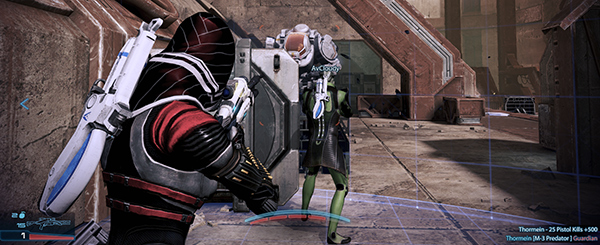
Remember when this is what Mass Effect sounded like?
There was a time when the story had a fairly straightforward theme, using electronic and orchestral sounds to draw us into a sweeping space opera with dark tones around the edges. Back then, of course, it was a more straightforward story.
It was a theme in an even time—a nice predictable 3/4—and it moved with a melody you could hum. It was a theme you could take with you, as a Spectre and member of the Alliance Navy, to march into battle against a single, known enemy.
But as we all know by now, the story of the Mass Effect series doesn't stay simple. It twists and branches, and the reapers eventually become a threat too devastating to imagine on a scale too wide to understand. But it's still Commander Shepard's story, and it's still Mass Effect. So where does the music go, as Shep shifts from new Spectre, to would-be pawn of the Illusive Man, to humanity's—or, really, the galaxy's—last desperate hope?
The series spans between 60 and 90 hours, across three games, and pulls many very cool musical tricks during that time. But some of the simplest are also the most effective. So where does the main theme fit in over the course of it all? Here are some of my favorite highlights.
In the first game, we meet Sovereign, and we learn about the concept of indoctrination. By hanging around near (or in) a reaper, you can start to believe anything... including the ultimate futility of your own cause. Starting around 00:17, Sovereign's theme quotes a bastardized, broken version of the main theme back at us, using the first four notes to draw us in. The message? "You, too, will fall."
Of course, the first game is the only one Shepard can't get him- or herself killed off in. And it ends with Victory: a 4/4, successful, military march that again uses the first four notes of the theme to draw us in. Only this time, it ends happily.
I love what happens to the theme in Mass Effect 2. (I wrote quite a bit about it, once upon a time.) It picks up the extra beat of irregularly, from the Illusive Man, and all the bombast of the Suicide Mission. But it's still very clearly the core of Mass Effect, just reimagined for a Shepard whose entire world has changed under her feet. While she was, well, being dead.
By Mass Effect 3 everything is well and truly shot to hell. The music most closely associated with the game focuses on the reaper chord, not Alliance heroics. But references to the main theme appear at all of Shep's major landmarks. The first three notes to kick off "The View of Palaven" (which is a sad view, as the place is under attack by reapers) call back to the theme, though the rest is busy, busy battle.
The reference to the opening notes of the main theme also shows up on Tuchanka. The mission where Shepard either cures the genophage or dooms the krogan to an infertile future has lasting import. At 02:16 especially, the reference is unmistakable. But the whole clip is also uniquely krogan—and uniquely female. It's the story of krogan women especially that Shepard can rewrite.
And then there is the world's saddest piano, the one that follows Shepard around on her final adventure. Through the first two games, the piano always signified moments of particular importance to Shepard. This time, the whole galaxy's fate is personal to her. But even more personal is the companion she fights for. And this is the music that plays during their final quiet moment together on board the Normandy. It also, as first heard around 0:11, refers back to the opening notes of the main theme rather poignantly.
Of course, this big, bold statement of the theme (starting at 0:19) is what we've been waiting to hear. Go, Alliance, go! Kick some reaper ass! Yay Crucible! Yay Civilization! You can do it! *tear*
The last reference is also the saddest. "An End, Once And For All" is what it says. It plays "Leaving Earth" for us with the reapers (and their chord, and their tension) removed. And at 01:38, it plays the music of Shepard, the Alliance, and exploration one last time.
Of course, that's just half of the Mas Effect main theme. The descending eighth notes (00:59) tell another big part of the story. And then there is music for geth, for reapers, for turians... for the Presidium and the Citadel, for exploration. For love, for loss, and for everything else.
But those are stories for another day.








 Q&A, an Australian current affairs program, ran an episode over the weekend about Easter. A big part of the show is that, while conversations are taking place in the studio, a ticker on the bottom of the screen lets viewers get their $0.02 in.
Q&A, an Australian current affairs program, ran an episode over the weekend about Easter. A big part of the show is that, while conversations are taking place in the studio, a ticker on the bottom of the screen lets viewers get their $0.02 in.

 As a result, Mass Effect 2 felt more like a TV show than a movie. Most of the game felt like a series of discrete episodes broken up by the occasional "A-Plot" episode that deals with the season-long story, what Buffy The Vampire Slayer coined the "Big Bad." In Mass Effect 2, the Collectors were the Big Bad.
As a result, Mass Effect 2 felt more like a TV show than a movie. Most of the game felt like a series of discrete episodes broken up by the occasional "A-Plot" episode that deals with the season-long story, what Buffy The Vampire Slayer coined the "Big Bad." In Mass Effect 2, the Collectors were the Big Bad.

 Jim’s done
Jim’s done 